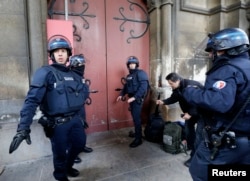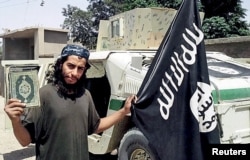There is growing concern among the ranks of U.S. officials that it could take more than one war to ultimately defeat and destroy the Islamic State terror group.
Many are optimistic the U.S. strategy of empowering local forces and backing them with airstrikes and other assistance is working, military officials pointing out Islamic State militants have only managed to lose territory in Iraq and Syria since May 2015.
But while such tactics may be eating away at the group’s self-declared caliphate and its conventional military force, some say a second, more complicated war will be needed to destroy Islamic State as a terrorist group.
“We’ve seen the number of people who do external operations increase,” a U.S. official told VOA on condition of anonymity, adding there has been a clear shift within the Islamic State’s ranks.
Instead of simply trying to inspire terror attacks in the West, the group is more intent on planning attacks with a heavier emphasis on what could be considered more traditional command and control, the official said.
The concern is great enough that Islamic State “external operation” planners have increasingly become targets of U.S. and coalition airstrikes in Iraq and Syria.
Attack planners targeted
According to U.S. Central Command, five of 10 Islamic State leaders killed in airstrikes in December played roles in planning terror attacks outside Iraq and Syria. Two of them, Abdel Kader Hakim and Charaffe al Mouadan, had links to the November terror attacks in Paris that killed 130.
According to Operation Inherent Resolve spokesman Colonel Steve Warren, Hakim was a forgery specialist who had ties to the Paris attack network, while Mouadan had direct links to Paris attack cell leader Abdelhamid Abaaoud. Mouadan was also actively planning additional attacks on the West, he said.
For ISIS, in their overall strategy, they don’t feel as if they are losing. They see it as ‘OK, you want A, you can have A; we will go for B, and if you want B, C, or D, we will attack where you are not’.
- Cyril Widdershoven
Exactly when the shift in Islamic State’s approach took place is difficult to determine, as attacking the West and Western targets has long been part of the group’s ambitions.
Some officials and analysts say the shift toward a more outwardly focus may have started following the militant group’s initial success in securing territory in Iraq and Syria, allowing it to put more resources into planning attacks in the West.
Others see it more as a response to the losses Islamic State has begun to suffer on the ground.
“The fact that they’re hurting, the fact that that momentum is against them is quite clear,” said Daveed Gartenstein-Ross, a terror analyst at the Foundation for Defense of Democracies.
“[Islamic State] certainly will continue trying to reinvent itself and continue, probably, to shift its strategy,” he said. “It’s just a matter of if their losses end up outstripping their ability to adapt. I think it’s actually likely that will be the case.”
Not wedded to legacy
Yet intelligence officials worry Islamic State will find ways to survive, specifically, learning from the fate of al-Qaida under the leadership of Osama bin Laden.
“As shown by the number of ISIL members recently killed who were tied to external attack planning, the group is less wedded to legacy AQ’s methodical and top-heavy plotting,” a U.S. counterterrorism official told VOA, using an acronym for the group.
Islamic State is also using its looser approach to command and control to its advantage, like in Paris where it used a foreign fighter to help mastermind a plot using like-minded, or inspired, individuals.
“ISIL’s online propagandists often blur the lines between inspiration and direction,” the official said.
But that propensity for blurring the lines could come back to haunt the group when it comes to Islamic State the self-declared caliphate versus Islamic State the terror group.
“Ultimately, by declaring the caliphate, they tied their legitimacy to the caliphate’s legitimacy,” said the Foundation for Defense of Democracies’ Gartenstein-Ross. "So if their caliphate is rendered non-viable in 2016 then, to put it mildly, they’ll have some explaining to do.”
But U.S. military officials are wary that the end of the self-declared caliphate will mean and end to Islamic State.
“It’s hard to separate,” said a U.S. official who asked not to be named. "You’re fighting an idea, too. You’ve got to get them to reject radical Islam.”
“Defeating ISIL militarily will come,” said Operation Inherent Resolve's Colonel Warren. “Defeating their ideology will require political reconciliation in Iraq and an end to the civil war in Syria.”


